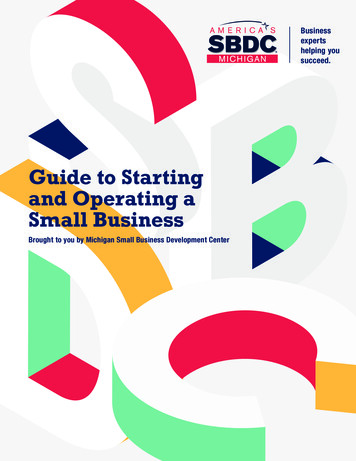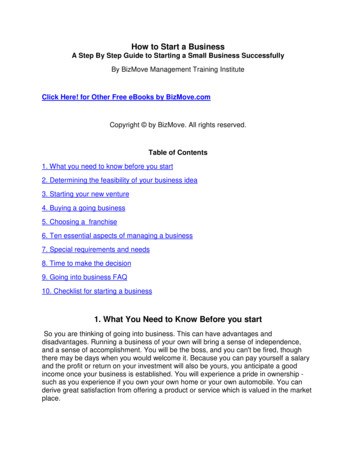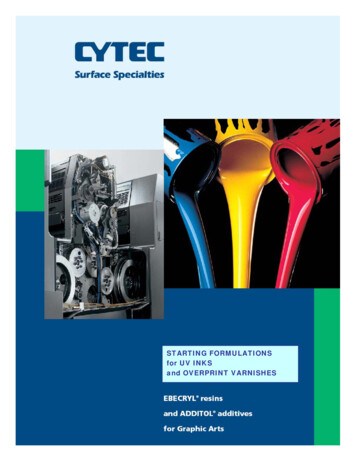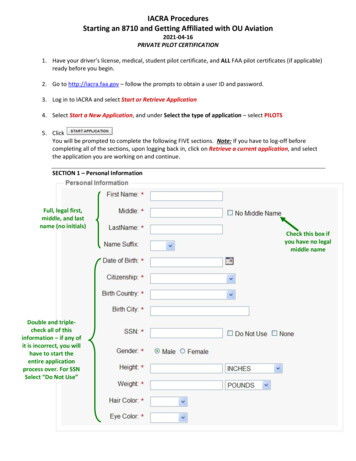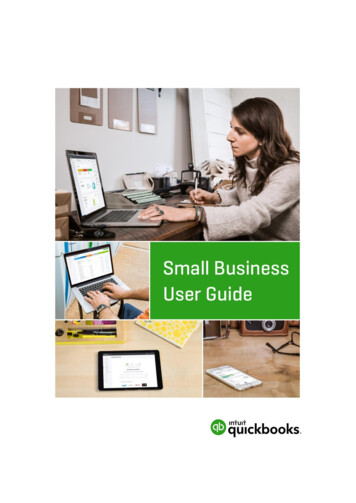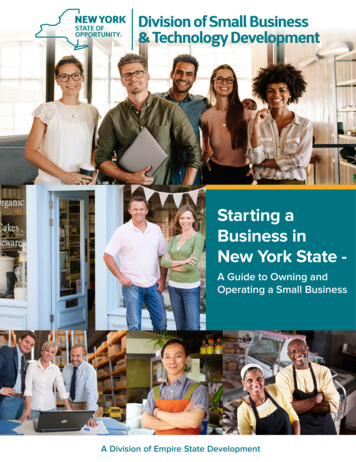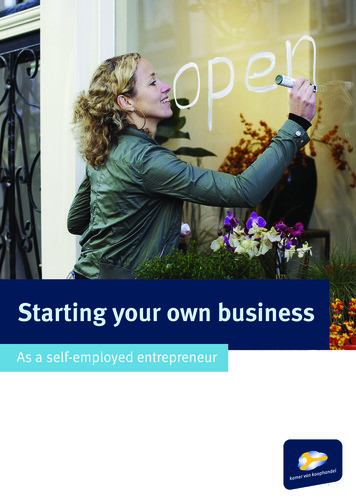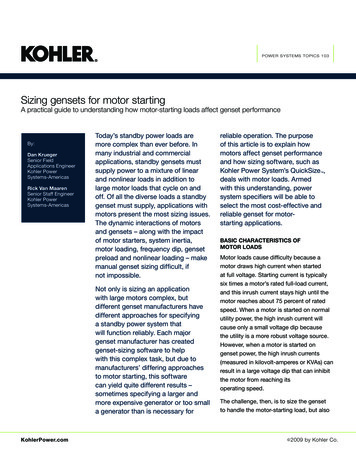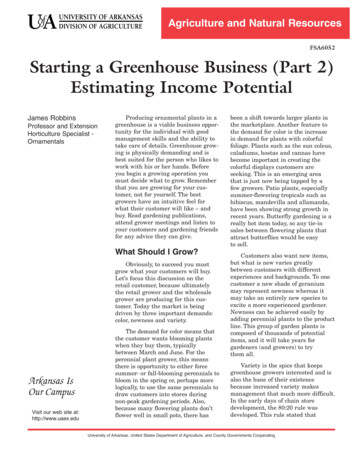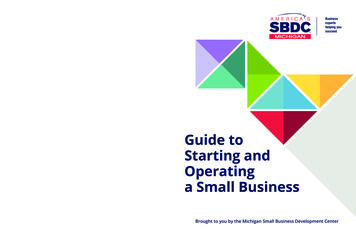
Transcription
Businessexpertshelping yousucceedwww.SBDCMichigan.org616-331-7480In partnership with:Funded in part through a cooperative agreement with theU.S. Small Business Administration. All opinions, conclusionsor recommendations expressed are those of the author(s)and do not necessarily reflect the views of the SBA.Guide toStarting andOperatinga Small BusinessBrought to you by the Michigan Small Business Development Center
Table of ContentsIntroduction . 21 Personal Assessment . 32 Steps to Starting a Small Business . 41. Select a Business Idea . 42. Market Research (Feasibility) . 43. Startup Cost/Financial Resources Analysis (Feasibility) . 8Sources of Financing/Startup Resources. 10Decision Point—Is it Feasible?. 114. Write a Business Plan. 12Business Plan Outline. 135. Complete the Startup Checklist. 186. Obtain Financing. 197. Start Your Business!. . 193 Registering a Business Name and Ways to Legally Structure a Business .204 Licenses, Permits and Other Regulations.25Patents, Trade, Service Marks, and Copyrights.265 Business Taxes. 286 Being Self Employed. 317 Hiring Employees. 338 Financing a Business . 399 Marketing Your Business . 43Sample Marketing Action Plan and Budget. 5110 Managing a Business. 52Technology & Cyber Security. 5311 Financials. 5412 Insurance . 6013 Selling to Government, Procurement Technical Assistance Centers (PTAC’s). 6214 Business Plan . 65Appendix A – Employee or Independent Contractor? . 72Appendix B – Required Workplace Posters . 74Appendix C – Small Business Development Centers (MI-SBDCs) . 76Appendix D – Business Resource Centers (BRCs) . 78Appendix E – MI-SBDC Business Education . 79Appendix F -- Index of State and Federal Government Websites . 80Appendix G – About the Small Business Administration (SBA). 82Appendix H – Ransomware Dos and Don’ts .85Appendix I – Cyber Security Canvas Document .86Revised March 2018 Copyright MI-SBDC . All Rights Reserved.1
Welcome to the Guide to Starting and Operating a Small Business!Helping businesses to open and grow is a focus activity of the Michigan Economic DevelopmentCorporation (MEDC), state government in general, and the Michigan Small Business DevelopmentCenter, which is the key partner in providing small business assistance across the state: Counseling,training, and research to assist any small business to launch, grow, transition, and innovate. This Guideis designed as an information tool, outlining as clearly as possible many of the steps, responsibilities,issues, or questions facing prospective and existing entrepreneurs.Information included in this guide is both general and Michigan-specific: Steps and process for starting abusiness; different forms of business organization; key elements of a business plan; complying withfederal, state and local tax obligations; basics related to management, hiring, marketing, and more.Though this guide is not a substitute for legal or financial counsel, it is an information resource and quickreference designed to make the process of starting and operating a business in Michigan a little lessoverwhelming.The information in this publication was accurate at time of publication, but it is subject to change due torevisions in law and administrative policies. Between published revisions, an online version is updatedperiodically if significant changes occur. The online PDF version can be accessed at:www.SBDCMichigan.org/GuideToStartingThis Guide combined with one-on-one MI-SBDC assistance and training is intended to help you moveforward on your business journey. In addition to MI-SBDC, there are many other resources available forstarting and operating a business in Michigan: Michigan Small Business Development Centers (MI-SBDCs) SCORE -- Counselors to America’s Small Businesses Assistance and counseling are also available from local economic development organizations,trade associations, local chambers of commerce, schools, community colleges, universities andpublic libraries.MI-SBDC is ready to help! For more information or to contact any of the MI-SBDC offices located aroundthe state, visit www.SBDCMichigan.org, or call MI-SBDC headquarters at Grand Valley State University:616.331.7480.Sincerely,Michigan Small Business Development Center2
Personal AssessmentAre You Ready to Start a Business?Being your own boss is wonderfully exciting, but isn’t for everyone. Anyone considering starting a business needsfirst to consider if s/he is suited for it, personally and professionally.There are no right or wrong answers to these questions. This self-evaluation is designed to help you thinkthrough critical aspects of your personal and business readiness to be self-employed. It will help you: Assessyour reasons and qualifications for going into business; set personal and business goals; consider if this is theright time to start a business; if you have the freedom, flexibility and resources to start a business; to consideryour health and stamina; and how you will balance family and business.Suggestion: It is recommended that you bring a completed version of this self-assessment to your first MISBDC consulting session. It will provide a profile of you and your readiness to help your consultant becomeacquainted with you. To self-assess, ask yourself the following questions and answer as honestly and in asmuch detail as possible.SELF ASSESSMENT: Are You Ready To Be In y do I want to start a business? OR Why am I in business?Specifically, what kind of business do I want to start (or am Iin)?Why do I believe I can make this type of businesswork?Why do I believe this type of business issustainable?Do I have the necessary education, skill and experience to succeed in this industry? Ifnot, can I obtain these qualifications before start-up; how?What is my true purpose and/or the goal I hope to accomplish with this business?What is the financial goal I am seeking toachieve?If I will need financing, do I have the resources and credit worthiness necessaryto be eligible? [High credit score plus assets, collateral and good financial history.]What are my strengths?What are my weaknesses?What is my physical, mental and emotional health and stamina?What knowledge and skills do I have to start and control the day-to-dayoperations of a business?Do I know and understand the technology necessary to be competitive in thisbusiness?Do I have good judgment in people andideas?What sacrifices and risks am I willing to take to be successful?What will it take for me to balance personal life and business demands?3
2Steps to Starting a Small Business“What do I need to do and what comes first?” That’s the question most often asked by peopleconsidering starting a business. There is a logical sequence of actions and a process for startinga business. MI-SBDC has created a “Steps to Starting a Business” checklist (page 5) that mapsout the tasks in recommended order to help you stay on track, manage the various steps, andgive you the confidence of knowing you have considered all the essential elements.1. Select a business idea.Step #1 is deciding on what type of business you want to start. The first question everyentrepreneur needs to ask about his/her product or service idea: “What problem does it solveor what need does it fill?” There are many reasons why consumers make purchase decisions,but the primary one is need.The first questionevery potentialbusiness ownerneeds to askabout his/herproduct or serviceidea—“Whatproblemdoes itsolve orwhat needdoes itfill?”2. Market Research (Feasibility).Market research is the first and most important task you need to accomplish before you start yourbusiness, to determine if your idea is feasible, which according to Webster’s Dictionary means“capable of being done; suitable.” Market research is the gathering of facts and figures to makean informed decision about the market potential for your business, about the prospects forsuccess and the direction your business will take – both at the start and periodically as youcontinue on your business journey.Type of Research Needed: The following describes the type of research needed using theexample of a pizza parlor, which is classified as part of the fast food industry:Industry is the big picture of what’s happening in the “total world” of your particular type ofbusiness. Look for answers to questions like: What’s happening in the fast food industrythese days – how many pizzas get sold in the U.S. or Michigan each year, are thereincreased sales, specialty pizzas, healthier alternatives, changes in sizes or packaging, moreor less pizza parlors in and out of business, etc.? What’s the big picture in the pizza world?Market is the total population of consumers or businesses that buy your particular product orservice – you can generally define them by a common set of characteristics. Marketsegments are groups within that population that you can define by even more specific set orsets of characteristics. Questions to answer could include: Who and how many are buyingfast food in the area or location I’m considering? How often do they buy? Can I group andidentify them based on any common characteristics such as age or ethnicity?Customers are the individual people or businesses that will buy your product or service. Agood exercise is to define your ideal customer and work backwards – where there’s one,you can find another just like it, then another, and so on. How many households exist in mygeographic area? How many of these eat pizza, and how often? How much pizza are these4
prospective customers likely to purchase in a year? (Customers x frequency x price market potential.)Competition is any business that sells a product or service that is exactly like what you want to do (Directcompetition) or that may be similar to or an alternative to your product or service (Indirect competition). Whereare other pizza shops? What are they like? What and where are other fast food, and/or grocery store foodoptions? Why would these prospective customers buy your pizza (and not the other choices)? Is there anunmet need, am I offering something totally unique, are they dissatisfied with other choices?5
The best sourceof marketresearchinformation isstill the library.Many havebusinesslibrarians and/orspace dedicatedto businessreferencematerials.How and where to do research (secondary):Local Library. The best source of market research information is still the library. Many havebusiness librarians and/or space dedicated to business reference materials. Look forinformation in sources and references related to your particular type of business, such asperiodicals, trade journals, newspapers, industry association and other reference books.Some of the books in which you might find information include: Directory of Trade Associations Trade Journals and Industry Publications Encyclopedia of American Industries Encyclopedia of Global Industries Economic Census, i.e., Census of Retail Trade, Census of Wholesale Trade, orCensus of Selected Services Other governmental statistic sources published by federal, state, and local agencies RMA (Risk Manage
business; different forms of business organization; key elements of a business plan; complying with federal, state and local tax obligations; basics related to management, hiring, marketing, and more. Though this guide is not a substitute for legal or financial counsel, it is an information resource and quick
